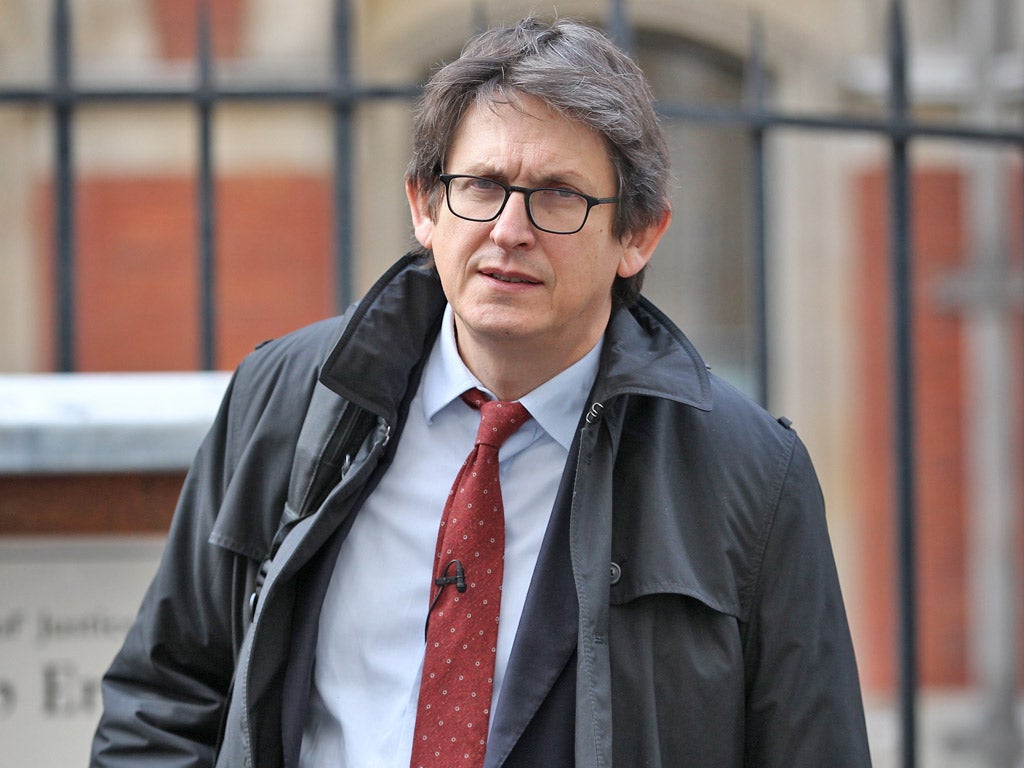The fight gets dirty: Sun accuses rival of using ex-MI6 men to tail civil servant
Guardian accused of 'highly invasive' undercover operation

The managing editor of The Sun hit back at one of News International's chief tormentors yesterday, turning on The Guardian during an appearance at a Parliamentary committee.
Richard Caseby, a long-standing News International executive, accused the paper of hiring ex-MI6 officers to carry out a surveillance operation on a leading Whitehall civil servant and his elderly mother. The Home Affairs Select Committee heard that Geoffrey Podger, currently the chief executive of the Health and Safety Executive, was targeted by former members of the Secret Intelligence Services (SIS) who had been commissioned by The Guardian and its editor-in-chief Alan Rusbridger.
Mr Podger was allegedly targeted in 2000 when he was the first chief officer at the Food Standards Agency because the newspaper had wrongly believed he was one of a number of Whitehall officials being paid by Monsanto, the biotechnology company and the world's best known producer of GM food. Mr Caseby said that Mr Podger was a "man of unblemished integrity" and that "there was no truth... whatsoever" in the allegations against the official.
"This was a highly invasive operation – albeit it took place 12 years ago – which targeted not only Mr Podger but also his elderly mother," Mr Caseby told MPs. "Let me say this was a fishing expedition by Mr Rusbridger only he was not fishing for salmon with a fly. This was a deep ocean industrial trawl that dredged the seabed of Mr Podger's private life."
Mr Caseby was cut short by the Labour MP David Winnick, who observed that News International might have "some sort of grouse against The Guardian". The animosity between the two news groups has greatly increased in the past two years as a result of The Guardian's coverage of the phone hacking scandal at News International, the British press arm of Rupert Murdoch's News Corp global empire.
Using parliamentary privilege, Mr Caseby personalised the description of the Whitehall probe, taking an opportunity to criticise Mr Rusbridger, who was last month given a prestigious American journalism award for his work on the phone hacking story.
In his witness statement to the Leveson inquiry into media standards, Mr Rusbridger made a brief mention of the operation run by the ex-MI6 officers. "In 2000, we commissioned a report about allegations of corrupt links between an international corporation and officials in Europe and Whitehall. We used a corporate security company run by two leading former SIS officials. They could not substantiate the allegations and no report appeared," he said.
Referring to the same passage yesterday Mr Caseby told MPs: "Reading that paragraph you could be forgiven for thinking that Mr Rusbridger had been starring in his own version of a Jason Bourne movie. In actual fact the truth is far more prosaic and perhaps troubling."
After Mr Caseby's evidence, Keith Vaz, the chair of the committee, which is carrying out an inquiry into the private investigations industry, said he would seek further information from The Guardian.
But Mr Podger said he had "no knowledge of being subjected to any such surveillance or investigation by The Guardian". He also said he "denies absolutely" having "acted in any way improperly" during his time at the FSA. Asked about News International allegations yesterday, The Guardian declined to comment further.
During the hearing, senior newspaper executives also disclosed the methods their papers used to track down the hard-to-reach subjects of stories. Mr Caseby said News International was impressed with GB Group, which maintains a vast database of phone numbers.
He told the committee that GB Group's software gave journalists access to a pool of 50 million telephone numbers, including 14 million mobile numbers and 13 million ex-directory numbers. "Those are all legally obtained because people have consented to giving those numbers either through marketing procedures or buying things online. It's a huge industry," he said.
On its website, GB Group emphasises the value of its "e-trace" system to debt collectors. "More and more people are struggling with debt, leaving companies with a huge problem in tracking down outstanding debtors and securing payment," it states.
The Daily Mail uses the same system, plus another lawful database called Tracesmart, the paper's deputy editor Jon Steafel told MPs. "They are simple online databases that people access information on," he said, emphasising the need to "rigorously test" stories by speaking to the parties concerned.
On its website, Tracesmart, which was set up in 1999, notes that "journalists, private investigators and tracing agents all need a data compliant single source of information".
Private eyes were hired as muscle, says BBC
The BBC claimed yesterday that much of its outlay of public funds on private investigators had been to provide "bouncers" to protect members of staff on programmes such as the consumer show Watchdog, presented by Nicky Campbell.
David Jordan, the director of editorial policy and standards at the BBC, said journalists working on such shows often required "what we call muscle" when they turned up on the doorstep of a potentially violent interviewee.
The BBC's director general Mark Thompson told the Leveson Inquiry in January that the organisation had spent more than £300,000 on private investigation firms over a six-year period. Mr Jordan also said there were exceptional occasions when the BBC would use "blagging" (obtaining information by adopting a false identity) and he gave two examples, both involving the monitoring of alleged paedophiles.
Ian Burrell
Subscribe to Independent Premium to bookmark this article
Want to bookmark your favourite articles and stories to read or reference later? Start your Independent Premium subscription today.
